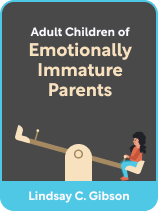

This article is an excerpt from the Shortform book guide to "Adult Children of Emotionally Immature Parents" by Lindsay C. Gibson. Shortform has the world's best summaries and analyses of books you should be reading.
Like this article? Sign up for a free trial here.
What is the key to maintaining a healthy relationship? How does your childhood affect your adult relationships?
In Adult Children of Emotionally Immature Parents, Lindsey Gibson proclaims that childhood emotional neglect can have a negative effect on your relationships in adulthood. This is because victims might be attracted to people who feel familiar.
Take a look at how to maintain healthy relationships to break the cycle.
Emotional Neglect Survivors Repeat the Cycle of Unhealthy Relationships
Before getting into how to maintain healthy relationships, we have to look at the cycle of emotionally neglectful relationships. Gibson asserts that children who grew up shutting down their feelings often end in emotionally disconnected relationships, because the dynamics feel familiar and there’s comfort in familiarity.
(Shortform note: An alternate explanation for why emotional neglect survivors repeat unhealthy relationship patterns is “repetition neurosis,” a phenomenon where adults try to reverse a familiar parental relationship dynamic to try to achieve a better outcome. For example, if your parent was frequently angry, you might choose a partner who’s often angry, and try to get them to be kinder and more gentle with you—only to discover that they can’t change.)
Adult children of immature parents may have a looming feeling that something in their relationship is “not quite right,” but accept that feeling as “normal” because they’re accustomed to feeling empty, lonely, or ill at ease from living with an emotionally disengaged parent. They may also dismiss the feeling because they grew up overriding their emotions in service to their parents’ needs. Because they can’t connect with or trust their own feelings, they may look to others to tell them how they feel.
(Shortform note: Gibson doesn’t explicitly say how emotional neglect survivors can learn to trust themselves, but experts say that building trust in yourself is a learning process. It begins with paying attention to moments in your relationships when you feel angry, ashamed, guilty, or hurt. These are signals that the other person in the relationship may have crossed your boundaries either verbally or through manipulation.)
Identify and Develop Connections with Emotionally Healthy People
Gibson says that adult children of emotionally underdeveloped parents often end up in a cyclical pattern of relationship dysfunction because they gravitate to people whose behavior replicates the emotionally unhealthy family dynamics they grew up with. To break out of this cycle, you have to make conscious decisions about incorporating emotionally healthy people into your life.
(Shortform note: Experts agree with Gibson that it’s important to make conscious decisions about bringing healthy people into your life, but they also argue that it can be helpful to spend some time on your own before diving into new relationships. Taking time to be by yourself can help you learn more about your true feelings, needs, and interests, putting you at a healthier starting point to begin new relationships.)
Gibson says that emotionally healthy people share two common characteristics:
- They’re invested in your well-being. They care about, respect, and validate your feelings, individuality, and boundaries, and look out for your best interests.
- Their behavior reflects a high level of emotional intelligence. They’re reliable, consistent, and truthful; they’re self-reflective and interested in growth and change; they acknowledge and address problems directly and can apologize when wrong.
The more of these qualities a person has, the more likely they’re capable of forming healthy emotional connections with others.
(Shortform note: In addition to the characteristics Gibson says are common in emotionally healthy people, psychologists say that emotionally healthy people generally like who they are, have a sense of meaning or purpose, and feel content with the life they’re living.)
Gibson says that bringing emotionally connected people into your world isn’t a one-way street: equally as important is engaging with them in emotionally healthy ways. To do this, always strive to be your authentic self, clearly communicate your true needs, interests and desires, ask for help when you need it, and stay connected with people who support and validate you.
(Shortform note: Research supports Gibson’s argument that it’s important to bring your emotionally healthiest, truest self to the table when incorporating new people in your life: Authenticity is connected to greater feelings of security, higher levels of satisfaction, and better outcomes in romantic partnerships. This is because when you’re valued for who you truly are, you’re able to relax and be yourself.)

———End of Preview———
Like what you just read? Read the rest of the world's best book summary and analysis of Lindsay C. Gibson's "Adult Children of Emotionally Immature Parents" at Shortform.
Here's what you'll find in our full Adult Children of Emotionally Immature Parents summary:
- A look at the damage that emotionally neglectful parents can do to their children
- Strategies to help adults turn their relationship with their parent from toxic to tolerable
- Ways to heal and move forward from childhood emotional neglect






